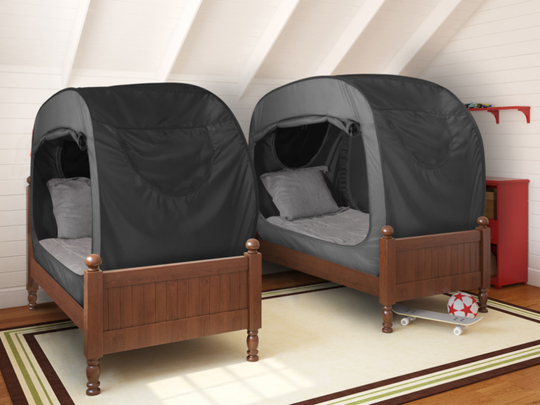
Dubai: A small bed-top tent has proved to be a surprise hit in the UAE where a number of low-income expatriates live in sharing accommodation with little privacy.
“The product is actually a top seller,” said a spokesman for Dubai-based LetsTango. “We are running out of stock every other day.”
However, he added that the tent is not fire-safe, and has not been tested by the company.
The company said the surprise success of the product is due to the large number of expat workers who live in shared apartments and rooms.
“Most of the people are living in bed spaces here, so we thought to market it this way,” the spokesman added.
Sharing rooms in apartments and villas is generally banned in Dubai, but for many low-income workers who cannot afford anything better, or who wish to save and send back home most of their salaries, there are often few options.
Living in a shared room is commonly referred to as a ‘bed space’. In some areas of Dubai, monthly rents start from around Dh500 per month.
Occupants commonly use curtains, and even plaster-partitions, in the quest to be shielded from prying eyes.
An expert from the UAE’s only local fire safety certification body, however, warned that the 85cm high tent, which has racked up 1,000 sales for one local online retailer, could pose a fire risk.
While not everyone can change their crowded living conditions, most can at least make sure to reduce the fire risk, said Abhishek Chhabra, spokesman for the Dubai-based Thomas Bell-Wright International Consultants.
“With a plastic-based bathroom curtain or tent, I would say they are fairly close in terms of risk [to bed space dwellers],” he said. His firm tests and certifies building materials for fire safety.
“Maybe the tent is a wee bit more risky, as it confines the occupant.” A slightly safer alternative to the tent could be to put up cotton curtains, which burns less easily.
“A cloth-based cotton curtain, is relatively less risky than anything which is made out of a synthetic material, whether it’s a curtain or a tent,” added Chhabra. “Even a cotton curtain is not free from fire risk.”
Last month, the UAE e-commerce site put the tent up for sale for Dh139, and ran a Facebook ad with the line: ‘Change your bed space to private room in no time.’
What the sales pitch lacked in grammar, it seemed to make up for in impact.
So far, most of the tent’s customers hail from the UAE, with others from Saudi and Qatar.
A user who posted a review of the tent on the retail site last week called the tent “a perfect bed for comfortable sleeping in [a] bed space environment”.
Later this month, Ebrahim, a Filipino laundry attendant who lives three-to-a-room in an Abu Dhabi flat, plans to buy one of the tents so he can sleep in peace.
“I want privacy,” he told Gulf News. “Because most of the time, my roommates come back from work late. They disturb my sleep when they switch on the lights.”
For Bettina, a Filipina who lives in Dubai in a room with five other people, is also planning a purchase.
“It’s great for privacy,” she said. “Aside from that, I’m the type of a person who can’t go to sleep with the lights on. Since I’m not living alone, there are things that we cannot avoid.”
As well as the risk of fire, another expat believes he may have found a potential flaw.
At 85cm high, the tent will not fit in the lower bunk of the double-decker beds used by many bed space dwellers.
“[It] looks good to use if your purpose is to sleep only privately,” said Clarence, a Filipino who lives in Dubai. Currently, he and his 12 roommates use curtains and wooden partitions for privacy. “But most people in Dubai rent a bed space with a double-decker [bunk] bed. That tent is only for a single bed.”









